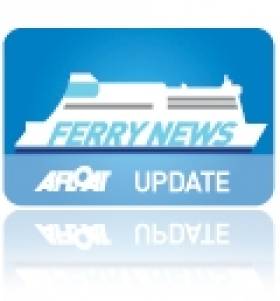Displaying items by tag: Larger FreightShip
#LargerSeatruckShip – Seatruck Ferries will be launching a larger 'P' class 14,000 tonnes freight vessel on the Dublin Port-Heysham route later this month, writes Jehan Ashmore.
The much larger capacity vessel with space for 110 units will replace the 65 unit Arrow which is currently operating on the route linking the Irish capital and the North Western English port in Lancashire.
As previously reported on Afloat.ie, the Arrow is to be chartered to the Isle of Man Steam Packet Company to boost freight capacity on the Douglas-Heysham route later this month.
In addition the larger Seatruck 'P' class vessel when introduced on the Dublin-Heysham route will also bring increased speed, schedule reliability and change of ships confirms the company's long-term commitment and strategic importance to the route.
The larger 110 unit vessel includes greater trailer free height and a faster turnaround time in port. The ship also benefits from a ramp interface to the lower hold instead of a lift. Drivers will also have use of single berth cabins and a comfortable lounge.
The Dublin - Heysham route provides an additional option for Seatruck customers, as the dedicated freight operator also operates the Dublin - Liverpool and Warrenpoint - Heysham routes.
The introduction of this larger vessel on the Dublin-Heysham will be the third P-class sister operating for Seatruck from the UK port.
The final P class series ship, Spanish built Clipper Point, which is the leadship of a quartet, remains on charter to DFDS Seaways operating Immingham - Cuxhaven route.
Returning to the Irish Sea, where Seatruck operate over 50 weekly departures and for details of the freight company's Easter Schedule, visit this link to download sailing schedule.





























































